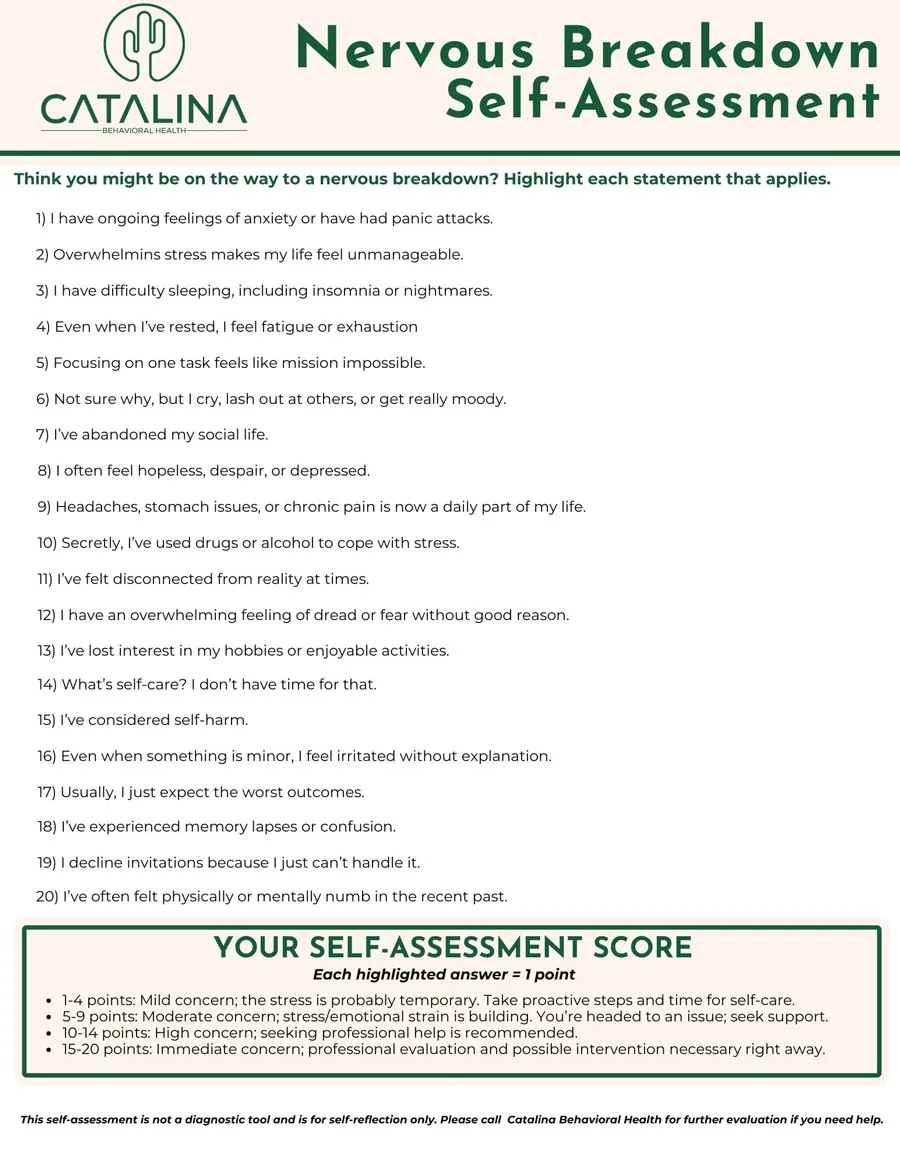Looking at the Nature and Duration of Nervous Breakdowns
If you have ever seen someone you love go through a mental health crisis, you might be curious to ask a question but have been afraid to ask. How long does a nervous breakdown last? You aren’t asking to be insensitive but out of a good place, concerned about someone you care about.
This mental breakdown can make a person experience such extreme stress that they forget about personal hygiene. It can make them feel so disconnected from friends that they retreat into social withdrawal.
A nervous breakdown makes people feel they’re losing control, and many don’t know how to pull themselves out of that dark place. The mental health team at Catalina Behavioral Health has seen many mental health crises, and we have the tools to help start the healing.
We invite you to read on to learn more about the causes of a nervous breakdown and answer your question about how long this mental health crisis might last.
Confidential Trauma and PTSD Assessment
Suicidal Thoughts Are an Immediate Mental Health Crisis
If you are reading this post because you see some warning signs present in someone in imminent danger of committing suicide or has verbalized plans to commit any self-harm, stop reading. Call the National Suicide Prevention Lifeline at *988 immediately.
What are the Causes of a Severe Breakdown?
Mental health crises happen for a variety of reasons – each person develops unique coping mechanisms and handles their triggers with varying degrees of resilience. For some, a mental health diagnosis leads to an emotional breakdown. But for others, a single trauma can lead to a nervous breakdown.
It’s also important to acknowledge that anyone can have a nervous or mental breakdown, even people without a mental health diagnosis. This situation can happen to anyone.
Anxiety Disorders or Another Underlying Mental Health Condition

Mental health conditions, especially when untreated or undiagnosed, are a frequent cause of a nervous breakdown. These include:
- Anxiety disorder
- Panic attacks
- Bipolar Disorder
- Depression
- Substance Abuse Disorders
Each mental illness can leave a person overwhelmed and unable to cope. With inadequate treatment, the weight of medical diagnosis becomes too heavy a load to carry. Both a psychotic break and a nervous breakdown are the body’s way of saying enough is enough, indicating the need for immediate help.
Experiencing a Stressful or Traumatic Event or Post-Traumatic Stress Disorder
Surviving or witnessing a horrifying or shocking event can cause intense stress for many people. Examples of this include a car wreck, losing a loved one (especially unexpectedly), or ongoing physical or sexual abuse.
These and other deeply traumatizing scenarios can overwhelm the brain’s ability to think clearly. They lead to emotional distress and can destabilize mental well-being until a nervous breakdown occurs.
Overwhelming Stress at Work or School
Uncontrollable stress leaves people more likely to have a mental breakdown, even if they have no prior history of a mental illness.
Facing an extremely difficult or stressful situation at school or work each day can cause mental exhaustion or burnout. Repeat living through those high-stress levels day after day with no tools to relieve stress.
This situation can increase the likelihood of a nervous breakdown.
Lacking a Social Support System
Imagine living your everyday life with no special person to talk to at the end of a day. No best friend, sibling, partner, or parent to offer social support. Those who lack any supportive people in their lives are more than just “lonely.” In fact, they are likelier to have a mental health crisis because they have nobody to listen to their problems a few hours a week.
The isolation can make it almost impossible to cope with the stress of daily life and leaves someone a prime target for nervous breakdowns.
Identifying the Symptoms of a Nervous Breakdown
A nervous breakdown may look different in each individual. Just as all people are unique, the symptoms vary. Here is a closer look at the mental and physical signs of someone experiencing a mental breakdown:
Mental Health Symptoms of an Emotional Breakdown
The warning signs of emotional distress can build until the symptoms start. These can disrupt daily life and deserve to have immediate, professional care.
- Severe anxiety or panic attack
- Depression or despair
- Inability to cope with emotional demands
- Emotional outbursts and mood swings
- Hallucinations
- Dissociation or detachment from others
- Threats of self-harm
These symptoms reveal a person struggling to cope. They urgently need an evaluation from a mental health professional.
Physical Symptoms of a Nervous or Mental Breakdown

The stress leading to a mental health breakdown may lead to physical symptoms:
- Extreme tiredness or fatigue
- Lack of enough sleep
- Muscle tension
- Headaches
- Upset stomach
- Chronic illness
- Chest pain
- High blood pressure
These symptoms overlap with many other medical conditions. Doctors and other mental health professionals have special training to get to the underlying cause of these symptoms. Once they determine a cause, the mental health professional can deliver the appropriate care.
Get Effective Trauma Treatment Options
Heidi’s Nervous Breakdown Taught Her to Take Care of Herself
‘Heidi,’ a professional woman in her early 40s, was often ‘rewarded’ by her company with an endless stack of ever-increasing responsibilities. She had spent over a decade balancing work, marriage, and two kids. The stress continued to build up, with Heidi rarely having the time to go to the gym to blow off steam, which she often used to enjoy.
The proverbial “other shoe” dropped when Heidi’s husband announced he was divorcing her. Feeling betrayed, she became withdrawn and began to neglect herself. She had emotional outbursts around the children and could barely focus while at work. She woke up one day after an unusually stressful week and felt paralyzed by depression. She felt fatigue so severe that she felt she’d been physically slammed into a brick wall.
The feeling persisted for several days, with Heidi calling out of work or an entire week. Recognizing that she was stuck in a depressed state that was completely unlike usual self, Heidi called her company’s EAP hotline. She learned that she has many signs of a nervous breakdown. Bad news.
Getting Mental Health Treatment Covered at Catalina
But there was also a glimmer of good news. The company’s group health plan covered mental health treatment, and she had accrued PTO. Heidi learned she was eligible for treatment at Catalina. She arrived still depressed and unable to function. The therapists helped her see that she was grieving for her lost marriage – the tipping point that had caused her to buckle under all her stress. She learned some good coping tools and rededicated herself to eating right and going to the gym at least 3 days per week.
With counseling behind her, Heidi is back to work but has learned to set boundaries with her manager and no longer allows herself to get saddled with too much busy work. She’s also regaining her love for physical fitness and has set a goal of entering a powerlifting competition by the end of the year – her children have never been prouder of her.
How Long Does a Nervous Breakdown Last?

How long a nervous breakdown might last varies depending on the contributing factors and the individual’s mental health needs. It can last just a day or two in some cases. It might last a few weeks for others.
During the nervous breakdown, the person mentally collapses under the pressure of a too-busy life or lack of self-care. They feel completely overwhelmed and stuck in one place. They may experience anxiety or panic attacks or lash out at others. These intense reactions to stress require rest and professional treatment.
In less frequent circumstances, a nervous breakdown might last for several months. This usually occurs in people with untreated mental health conditions or with a family history of complex mental illnesses.
Get Immediate Help For Mental Health Treatment
Recovery After Experiencing a Nervous Breakdown
Coming to Catalina Behavioral Health for recovery after a mental breakdown will ensure you receive the best care around. Recovery at our home-like facility includes comprehensive strategies to help reduce the risk factors that caused the nervous breakdown. Our team treats every client with kindness and compassion as they heal.
We also point out that even after the worst symptoms start to clear, some people feel the lingering effects of the nervous breakdown until they have found healthy ways to manage stress.
How Is a Nervous Breakdown Treated?
We tailor recovery plans to suit each individual who comes to us for nervous breakdown recovery. Some approaches include therapy, group support, medication management, serving a healthy diet, and recommendations on lifestyle changes.
A Treatment Plan Must Include Healthy Lifestyle Changes
While getting a lot of rest most certainly helps to clear the mind and start feeling well again, the treatment will not be long-lasting without addressing stress management to achieve a healthier lifestyle.
Some relaxation techniques you will likely try during your time in recovery at Catalina are the following:
- Progressive muscle relaxation, relaxing muscle groups to relieve the body of tension
- Breathing exercises
- Mindfulness and meditation
- Yoga
- Art or music therapy
These relaxation techniques are all healthy outlets for stress. You can take them back into everyday life and use them when overwhelmed or excessively worried.
Preventing a Recurrence of This Form of Severe Mental Distress

After experiencing a nervous breakdown, it’s time to spend a few hours a week looking after your needs to prevent it from happening again. Here are some things that we often recommend:
- Self-care routine: Find a way to show yourself some love every day. You might enjoy saying positive affirmations in a mirror or treat yourself to a long, hot shower every morning to prepare for a busy day. Whatever works for you, do it.
- Support groups: A support group helps you learn coping strategies from others who have been through similar mental health crises. AA and NA are ideal if you also struggle with substances. If not, think about joining SMART Recovery, which has a broader focus on addictive behaviors that deteriorate mental well-being. SMART is great because it doesn’t focus only on drinking or drug abuse like some other support groups. People in SMART may have issues with gambling, eating, or cutting – any compulsions that result from a mental breakdown.
- Cultivate your closest relationships: If a lack of social support contributed to your nervous breakdown, consider putting in the work to grow your current acquaintances into meaningful friendships. With this groundwork laid, you will gain a new support system.
- Eat well and exercise: Food and workouts do more than make your body stronger; they also nourish your brain, and may help you regulate your emotions better.
A nervous breakdown may be a scary situation. But with the right recovery plan and ongoing commitment to wellness, you will significantly reduce your chances of having them recur.
Up To 100% of Rehab Costs Covered By Insurance
Choose Catalina for Help With Mental Health Issues Today
Our mental health professionals understand that a nervous breakdown is a serious mental health condition. We’ll work with you to discover what triggered this event and help you find new tools to cope with whatever life throws your way in the future. After nervous breakdown treatment, you’ll be stronger and more resilient than ever.
Give us a call today; we can often take emergency admissions and all calls are kept strictly confidential, so please reach out for our compassionate support now.





